-
ORIGINAL ARTICLE11-22-2024
Transitions experienced by people living with limitations resulting from leprosy: a research-care study
Revista Brasileira de Enfermagem. 2024;77(5):e20230229
Abstract
ORIGINAL ARTICLETransitions experienced by people living with limitations resulting from leprosy: a research-care study
Revista Brasileira de Enfermagem. 2024;77(5):e20230229
DOI 10.1590/0034-7167-2023-0229
Views0See moreABSTRACT
Objective:
to understand the transitional processes that affect the adaptation of people who live with limitations resulting from leprosy.
Methods:
This is a qualitative study based on the precepts of Transition Theory, mediated by care-research, with 24 people with limitations resulting from leprosy in an ex-hospital colony in Piauí. Semi-structured interviews were carried out. The interviews were analyzed using Iramuteq software.
Results:
the researched-caregivers experienced the four types of transitions, including feelings of fear, worry, loneliness, hopelessness, guilt and a tendency to hide the diagnosis. Breakdowns and resignation were revealed, with spirituality, adaptation to the new life situation and acceptance as facilitating conditions for coping with the transitional process, with a consequent improvement in quality of life.
Final considerations:
the transitional processes had a positive significance, since they contributed to adaptation and the achievement of quality of life.
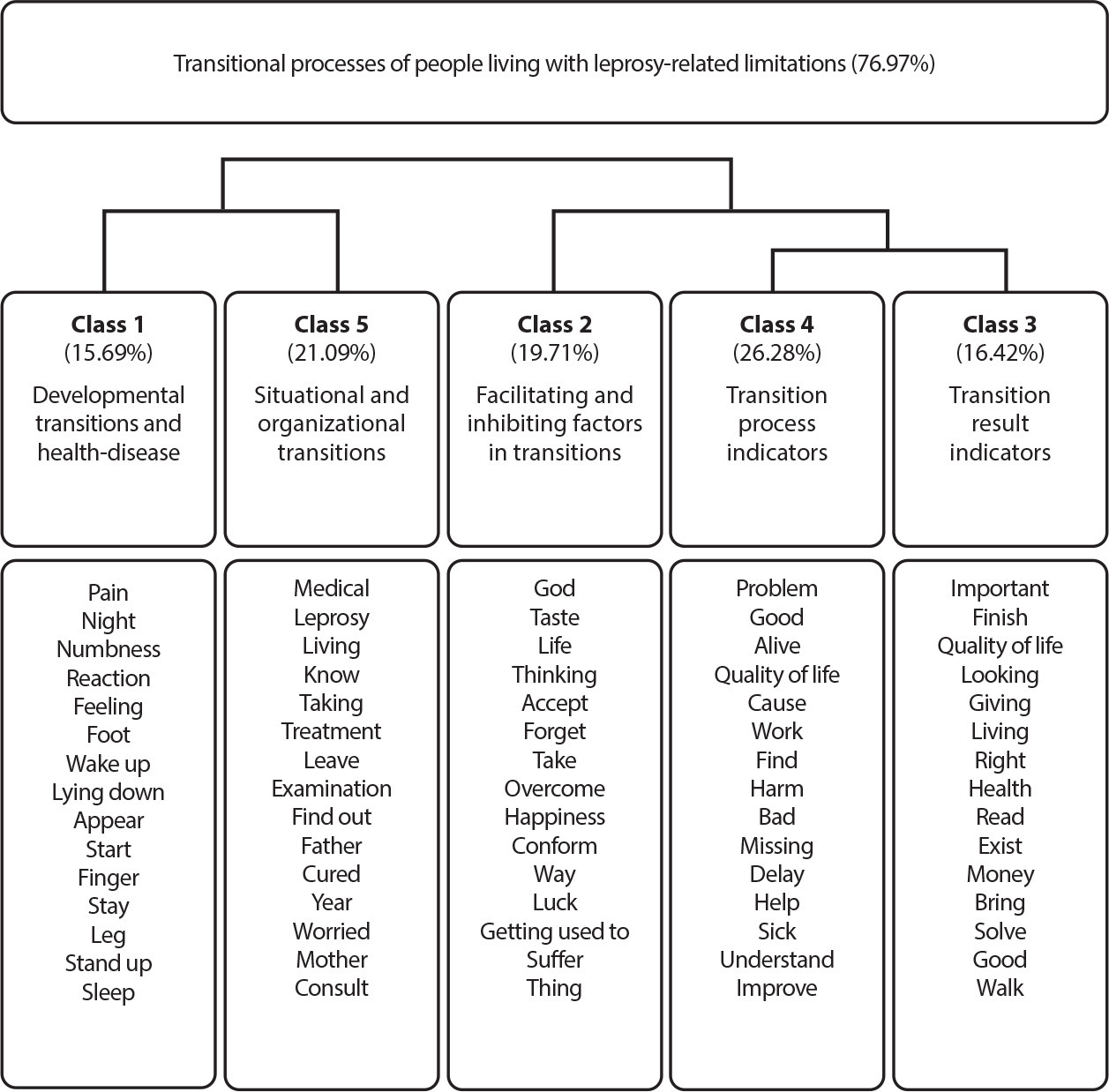
-
11-22-2024
Percepções de pessoas com deficiência física sobre acessibilidade e condições sociais: intervenções para enfermagem de reabilitação
Revista Brasileira de Enfermagem. 2024;77(5):e20240005
Abstract
Percepções de pessoas com deficiência física sobre acessibilidade e condições sociais: intervenções para enfermagem de reabilitação
Revista Brasileira de Enfermagem. 2024;77(5):e20240005
DOI 10.1590/0034-7167-2024-0005
Views0See moreRESUMEN
Objetivos:
analizar las experiencias de personas con discapacidad física adquirida en cuanto a accesibilidad y condiciones sociales; identificar intervenciones de rehabilitación dirigidas por enfermeras para la accesibilidad y condiciones sociales; determinar indicadores sensibles a la enfermería para mejorar la accesibilidad y condiciones sociales.
Métodos:
estudio cualitativo descriptivo-exploratorio utilizó entrevistas semiestructuradas con personas con discapacidad física adquirida mediante muestreo intencionado en bola de nieve para cumplir con todos los objetivos. El análisis de datos siguió los principios del análisis de contenido de Bardin. Los objetivos 2 y 3 se lograron mediante un enfoque teórico reflexivo.
Resultados:
los 27 participantes informaron desafíos de accesibilidad, que impactan las actividades de la vida diaria y las condiciones sociales. Esto influye en la enfermería de rehabilitación, dando lugar a tres campos de intervención: Evaluar la capacidad para realizar actividades diarias y los factores que influyen; Desarrollar e implementar capacitación para la realización de actividades diarias; Promover la movilidad, la accesibilidad y la participación social.
Consideraciones Finales:
a partir de las experiencias de los participantes, identificamos intervenciones de rehabilitación dirigidas por enfermeras para promover la accesibilidad y condiciones sociales.
-
ORIGINAL ARTICLE11-22-2024
Sociodemographic and occupational influences on health professionals’ quality of life
Revista Brasileira de Enfermagem. 2024;77(4):e20240010
Abstract
ORIGINAL ARTICLESociodemographic and occupational influences on health professionals’ quality of life
Revista Brasileira de Enfermagem. 2024;77(4):e20240010
DOI 10.1590/0034-7167-2024-0010
Views0See moreABSTRACT
Objective:
To analyze the sociodemographic and occupational influences on health professionals’ quality of life.
Method:
This descriptive-exploratory, cross-sectional, analytical, and quantitative study addressed 94 health workers, including nursing technicians, nurses, and physical therapists working in Intensive Care Units in a town in the extreme south of Brazil in 2023. The student’s t-test and Spearman correlation were used.
Results:
A significant positive correlation was found between being a woman and the psychological domain and between income and the social and environmental domain while working hours were inversely related to general QoL. Additionally, workload negatively impacted the physical, psychological, and general QOL, furniture negatively influenced the psychological domain, and equipment was negatively associated with the physical and psychological domain.
Conclusion:
The characteristics of the work environment interfere with several areas of quality of life.
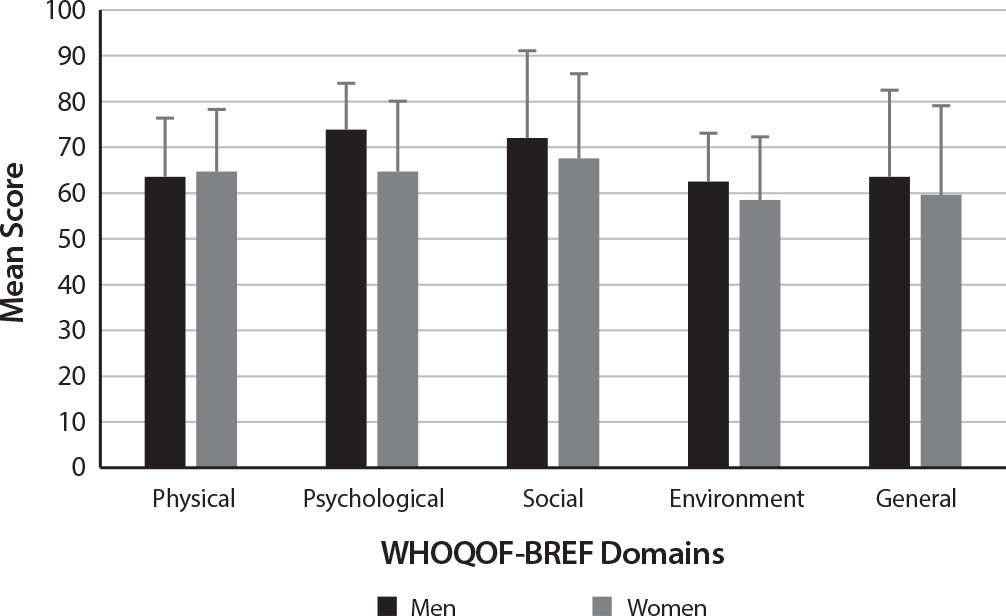
-
REVIEW11-22-2024
Concept analysis of youth: understanding the plurality of subjects
Revista Brasileira de Enfermagem. 2024;77(4):e20240002
Abstract
REVIEWConcept analysis of youth: understanding the plurality of subjects
Revista Brasileira de Enfermagem. 2024;77(4):e20240002
DOI 10.1590/0034-7167-2024-0002
Views0See moreABSTRACT
Objective:
To analyze the concept of “youth.”
Methods:
This is a concept analysis guided by the method proposed by Walker and Avant, operationalized through an integrative literature review. The search in scientific databases was carried out using the descriptors: youth; young; adolescence. To compose the literary corpus, 22 studies were selected.
Results:
Various factors were found in the antecedents that influence the separation of youth groups, contributing to the heterogenization of this population. The attributes include characteristics that comprise the formation of youth groups, especially the idea of shared experiences and social construction, as well as the consequences of the mentioned concept. After systematizing the variables, the analysis was conducted, highlighting the conceptions that influence youth.
Conclusion:
The study demonstrated the multifactorial complexity of the formulation of the concept of youth, highlighting various factors that contribute to this construction. For nursing, this conceptual field allows for an understanding of the population and effective engagement with this group.
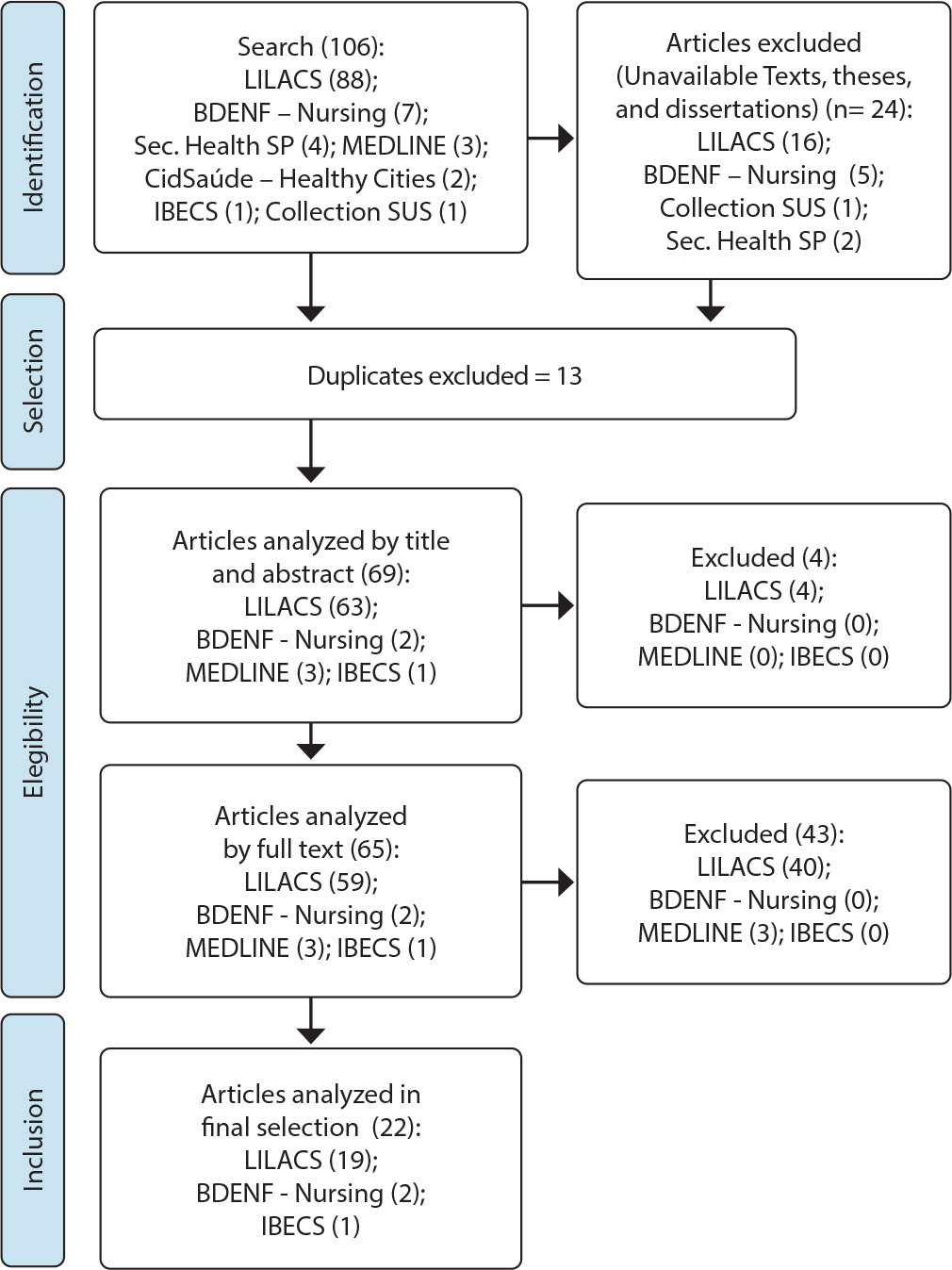
-
ORIGINAL ARTICLE11-22-2024
Temporal trends in neonatal mortality in Pernambuco
Revista Brasileira de Enfermagem. 2024;77(4):e20230451
Abstract
ORIGINAL ARTICLETemporal trends in neonatal mortality in Pernambuco
Revista Brasileira de Enfermagem. 2024;77(4):e20230451
DOI 10.1590/0034-7167-2023-0451
Views0See moreABSTRACT
Objective:
To verify the temporal trend of neonatal mortality in the health regions of Pernambuco between 2000 and 2020.
Method:
A time-series ecological study was conducted, analyzing the total neonatal mortality rate and its early and late components. For regression analysis, Joinpoint Regression was applied, trends were classified, and annual and average percentage changes were calculated for the period, with a significance level of 95%.
Results:
The average neonatal mortality rate in Pernambuco was 11.5 during the studied period. A decreasing trend in neonatal mortality rate was observed, especially in the early component. The region where the state capital is located showed the fastest decrease across all components.
Conclusion:
The temporal trend of neonatal mortality was decreasing; however, the rate of reduction was not uniform across the health regions of the state, and the implementation of the Mãe Coruja Pernambucana Program did not impact the trend in neonatal mortality.
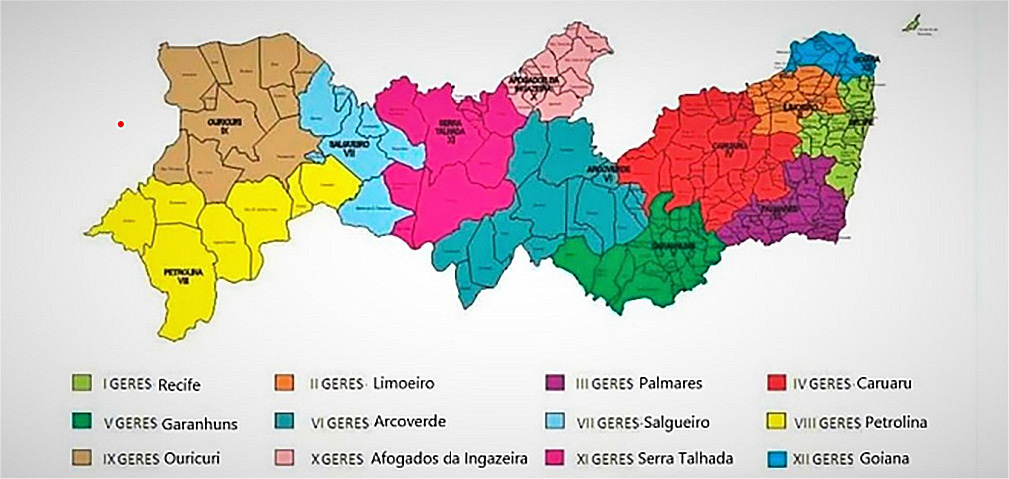
-
ORIGINAL ARTICLE11-22-2024
Evaluation of a video to promote HIV testing in sexual minorities
Revista Brasileira de Enfermagem. 2024;77(4):e20230320
Abstract
ORIGINAL ARTICLEEvaluation of a video to promote HIV testing in sexual minorities
Revista Brasileira de Enfermagem. 2024;77(4):e20230320
DOI 10.1590/0034-7167-2023-0320
Views0See moreABSTRACT
Objective:
To design and evaluate an educational video aimed at promoting HIV testing in gay men from the theoretical perspective of the Nola J. Pender Health Promotion Model.
Methods:
The design comprised five steps: 1.- Literature search; 2.- Formulation of the educational objective; 3.- Drafting of the script and location of the information in the theoretical components; 4.- Production; and 5.- Evaluation by experts and the target population.
Results:
The video “Living Without Fear” was produced, which presents the dilemma faced by gay men before taking a HIV test. The content validity index was 0.85, which indicated that the information was adequate and acceptable for promoting the rapid HIV test.
Final Considerations:
The results contribute to the scientific evidence aimed at promoting healthy behavior. In addition, the video was shown to be an acceptable educational tool.
-
ORIGINAL ARTICLE11-22-2024
Development and validity of a mobile application prototype for hospital shift handover
Revista Brasileira de Enfermagem. 2024;77(4):e20230173
Abstract
ORIGINAL ARTICLEDevelopment and validity of a mobile application prototype for hospital shift handover
Revista Brasileira de Enfermagem. 2024;77(4):e20230173
DOI 10.1590/0034-7167-2023-0173
Views0See moreABSTRACT
Objective:
To develop and validate a mobile application prototype for nursing shift handover in a hospital inpatient unit.
Methods:
A methodological study of technological production, carried out from April 2020 to January 2022, for mobile application construction and validity through the Design Thinking methodology. The study involved the stages of prototype development and validity by experts.
Results:
The application for mobile nursing shift handover obtained a usability score of 79 points and a content validity coefficient of 0.7.
Conclusions:
The instrument obtained an excellent assessment according to usability and agreement among experts. However, future studies are needed to implement this technology in order to assess effectiveness, time optimization and failures during communication.
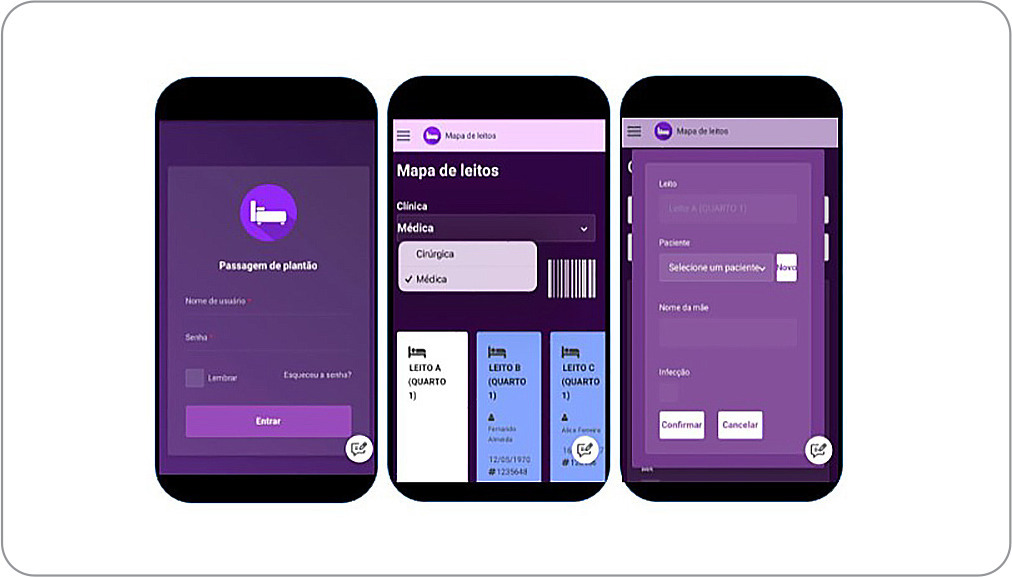
-
ORIGINAL ARTICLE10-25-2024
Analysis of the vaccination situation against Mpox in people living with HIV/AIDS: an ecological study
Revista Brasileira de Enfermagem. 2024;77(5):e20230234
Abstract
ORIGINAL ARTICLEAnalysis of the vaccination situation against Mpox in people living with HIV/AIDS: an ecological study
Revista Brasileira de Enfermagem. 2024;77(5):e20230234
DOI 10.1590/0034-7167-2023-0234
Views0See moreABSTRACT
Objectives:
to analyze the vaccination situation against Mpox in people living with HIV/AIDS in Brazil.
Methods:
an ecological study on the vaccination status against Mpox in people living with HIV/AIDS (PLWHA) in Brazil. The data were collected in April 2023 through information from the Ministry of Health, using the “Microsoft app Power BI,” which is publicly accessible.
Results:
the data analysis revealed that in Brazil, 2,978 doses of the MVA-BN Jynneos Mpox vaccine were administered in PLWHA, resulting in a vaccination coverage of 18.3%, with the southern and southeastern regions showing the lowest and highest vaccination coverage, respectively. Gender-based evaluation showed a higher proportion of vaccinated males.
Conclusions:
we identified low vaccination coverage in all regions of Brazil, highlighting the need for intensified vaccination activities, especially for PLWHA.
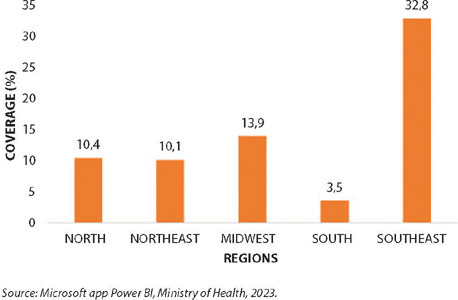
-
REVIEW07-09-2021
Nursing care for patients in post-transplantation of hematopoietic stem cells: an integrative review
Revista Brasileira de Enfermagem. 2021;74(3):e20200097
Abstract
REVIEWNursing care for patients in post-transplantation of hematopoietic stem cells: an integrative review
Revista Brasileira de Enfermagem. 2021;74(3):e20200097
DOI 10.1590/0034-7167-2020-0097
Views0See moreABSTRACT
Objectives:
to analyze the available evidence on the nursing care provided to patients after hematopoietic stem cell transplantation.
Methods:
integrative review with the search for primary studies in four databases and a virtual health library. A broad search strategy was used, including research published in English, Brazilian Portuguese, or Spanish, between 2008 and 2018, totaling a sample of 42 studies.
Results:
the studies were grouped into three categories: multiple nursing care (n=19), first-line care (n=18), and self-management of care (n=5).
Conclusions:
nursing care is critical, comprising patients’ physical, psychological and social aspects. It occurs in hospital and home contexts, mainly involving technical actions and health guidance. The evidence identified provide subsidies for decision-making; however, most studies are of the non-experimental type, indicating the need for conducting intervention research.

-
ORIGINAL ARTICLE04-22-2020
Indicators of effectiveness of nursing care in the dimension of patient safety
Revista Brasileira de Enfermagem. 2020;73(3):e20180833
Abstract
ORIGINAL ARTICLEIndicators of effectiveness of nursing care in the dimension of patient safety
Revista Brasileira de Enfermagem. 2020;73(3):e20180833
DOI 10.1590/0034-7167-2018-0833
Views0See moreABSTRACT
Objectives:
to validate nursing care effectiveness indicators of patient safety dimension.
Methods:
quantitative survey, using the electronic Delphi sampli, with 52 participants selected by the Snowball sampling. Eight indicators were evaluated regarding the attributes: availability, reliability, simplicity, representativeness, sensitivity, comprehensiveness, objectivity, cost, utility, stability and timeliness. For validation, the minimum agreement criterion was 70%.
Results:
Cronbach’s alpha (0.942) evidenced the high internal consistency among the attributes. The indicators fall with damage, hip fracture, and postoperative hip fracture, incidents related to equipment, incidents due to failures in patient identification, and pressure injury were validated in all attributes, and those of medication error and hand Hygiene were not validated.
Conclusions:
the validated indicators allow assessment of the effectiveness of hospital nursing care. Unavailability of data is an obstacle to monitoring patient safety.
-
ORIGINAL ARTICLE06-01-2020
Prisoners of suffering: perception of women on violence practiced by intimate partners
Revista Brasileira de Enfermagem. 2020;73:e20190219
Abstract
ORIGINAL ARTICLEPrisoners of suffering: perception of women on violence practiced by intimate partners
Revista Brasileira de Enfermagem. 2020;73:e20190219
DOI 10.1590/0034-7167-2019-0219
Views0See moreABSTRACT
Objective:
to describe the perceptions of women, prisoners or partners of imprisoned men who experience/experienced intimate partner violence, and how they cope with this situation.
Method:
a descriptive exploratory study with a qualitative approach conducted with 21 women. Empirical data collected between March and August 2018, through audio-recorded semi-structured interviews, were submitted to thematic content analysis.
Results:
women reported experiencing different forms of violence, which triggered suffering and negative commitment in their lives, far beyond the act itself, especially by the emotional and physical marks and their consequences. They also realize that coping with violence is individual responsibility, lived in the counterpoint between the desire to overcome it and passivity.
Final considerations:
intimate partner violence was uniquely revealed by women as a solitary experience, with permanent consequences in the physical, emotional, patrimonial, sexual and moral spheres, and limited internal and external resources make it difficult to cope with it.
-
ORIGINAL ARTICLE06-01-2020
Performance of nurses in the bed management service of a teaching hospital
Revista Brasileira de Enfermagem. 2020;73(4):e20190349
Abstract
ORIGINAL ARTICLEPerformance of nurses in the bed management service of a teaching hospital
Revista Brasileira de Enfermagem. 2020;73(4):e20190349
DOI 10.1590/0034-7167-2019-0349
Views0See moreABSTRACT
Objectives:
to analyze the performance of nurses in the Bed Management service of a public teaching hospital.
Methods:
descriptive, qualitative research inspired by Dubois theoretical model. 32 participants from the bed management unit and care units of a public hospital were interviewed from February to May 2018. Observations and data records from the Bed Management service complemented data collection. Theme/Category-Based Content Analysis was used.
Results:
the performance of nurses was described in three analysis matrices, represented by the categories: acquisition, implementation and maintenance of nursing resources; transformation of nursing resources into nursing service and results of the work of the nurse in Bed Management.
Final Considerations:
understanding the performance of nurses in bed management contributes to the scenario of new practices and different roles that favor visibility and strengthening of the nurse’s identity.
-
ORIGINAL ARTICLE12-13-2019
Support systems in the pediatric intensive therapy unit: family perspective
Revista Brasileira de Enfermagem. 2019;72:243-250
Abstract
ORIGINAL ARTICLESupport systems in the pediatric intensive therapy unit: family perspective
Revista Brasileira de Enfermagem. 2019;72:243-250
DOI 10.1590/0034-7167-2018-0588
Views0See moreABSTRACT
Objective:
to identify and to analyze the support systems used by family members for the adaptation process to the child’s hospitalization in the intensive care unit.
Method:
qualitative research, conducted in a hospital located in the Southern Brazil. Data were collected between June and July 2017, through semi-structured interviews with family members of hospitalized children. The adaptation model and thematic analysis were used for data processing.
Results:
four themes emerged: family and friends as a support system; the family members of other hospitalized children as a support system; spirituality as a support system; health team as a support system.
Final considerations:
identifying the support systems used in the process of family adaptation and their manifestations of interdependence was possible. The need of the nurses to intensify the listening to strengthen the support system of the family members of the children hospitalized in the unit studied.
-
ORIGINAL ARTICLE04-22-2020
Freedom-deprived women: social representations of prison, violence, and their consequences
Revista Brasileira de Enfermagem. 2020;73(3):e20180781
Abstract
ORIGINAL ARTICLEFreedom-deprived women: social representations of prison, violence, and their consequences
Revista Brasileira de Enfermagem. 2020;73(3):e20180781
DOI 10.1590/0034-7167-2018-0781
Views0See moreABSTRACT
Objective:
To understand the social representations that women deprived of their freedom have of imprisonment, violence, and their consequences.
Method:
An exploratory-descriptive qualitative study with 15 women from a female penitentiary in the State of São Paulo, Brazil. Semistructured interview was used. Data submitted to thematic content analysis and interpreted under Social Representations.
Results:
Categories identified: “Enclosed and abandoned in the prison environment”: loss of contact with relatives, difficulties living in prison, and right to be reinserted into society. “Imprisoned in a cycle of social inequality”: lack of support, access to education and employment opportunities, leading them to engage in new illicit activities and consequent imprisonment.
Final considerations:
The social representations of prisoners suggest that they perceive themselves to be doubly “imprisoned”, either from the objective point of view, as an individual deprived of freedom; or subjective, as citizens who have their rights disrespected and their possibilities of rehabilitation limited by the prison system.
-
ORIGINAL ARTICLE08-20-2021
Resilience of family caregivers of children and adolescents in treatment of neoplasms and associated factors
Revista Brasileira de Enfermagem. 2021;74(6):e20190388
Abstract
ORIGINAL ARTICLEResilience of family caregivers of children and adolescents in treatment of neoplasms and associated factors
Revista Brasileira de Enfermagem. 2021;74(6):e20190388
DOI 10.1590/0034-7167-2019-0388
Views0See moreABSTRACT
Objectives:
analyze the level of resilience of family caregivers of children and adolescents hospitalized for cancer treatment and associated factors.
Methods:
cross-sectional study, carried out in 2018, with 62 family caregivers in a university hospital in the state of Rio Grande do Sul, Brazil. The instruments CDRisc-10-Br, SRQ20, PSS-14 and WHOQOL-Bref were used to measure resilience, minor psychological disorders, stress, and quality of life, respectively. Inferential statistics were used.
Results:
female caregivers, married, with one child and who practice some predominated religion. They were classified as having a moderate level of resilience (48.4%); with suspicion for minor psychological disorders (45%) and high level of stress (41%). In terms of quality of life, they were satisfied in the Physical, Psychological and Social Relations domains; and dissatisfied in the Environment domain.
Conclusions:
there were direct weak to moderate correlations between the level of resilience and quality of life and inversely with stress and minor psychological disorders.
-
ORIGINAL ARTICLE08-18-2021
Mapping of advanced practice nursing actions in the Family Health Strategy
Revista Brasileira de Enfermagem. 2021;74:e20210228
Abstract
ORIGINAL ARTICLEMapping of advanced practice nursing actions in the Family Health Strategy
Revista Brasileira de Enfermagem. 2021;74:e20210228
DOI 10.1590/0034-7167-2021-0228
Views0See moreABSTRACT
Objectives:
to map advanced practice nursing actions implemented in the Family Health Strategy context.
Methods:
cross-sectional exploratory study carried out with Family Health Strategy nurses. Data obtained in the mapping were compared to the characteristics that define advanced practice nurses and are adopted internationally by using a checklist based on the International Council of Nurses Guidelines.
Results:
the mapping allowed to identify advanced practice nursing actions, such as advanced assessment, judgement, decision-making, and diagnostic reasoning skills and authority to diagnose and prescribe medications, diagnostic testing, and therapeutic treatments. However, evidence found in the educational preparation domain indicated evident fragility, expressed as the low percentage of nurses credentialed with a professional master’s degree.
Conclusions:
the present study showed that nurses in the Family Health Strategy carry out advanced practice nursing actions without the professional master’s degree recommended for credentialing, with pertinent legislation, which requires initiatives to be taken by nursing leaders to overcome this deficiency.
Search
Search in:
Nuvem de Tags
Adolescente (85) Atenção Primária à Saúde (239) COVID-19 (91) Criança (91) Cuidados de Enfermagem (269) Educação em Enfermagem (151) Educação em Saúde (139) Enfermagem (930) Enfermagem Pediátrica (86) Estudantes de Enfermagem (77) Estudos de Validação (131) Família (87) Idoso (208) Promoção da Saúde (99) Qualidade de Vida (104) Saúde do Trabalhador (86) Saúde Mental (145) Saúde Pública (82) Segurança do Paciente (150) Tecnologia Educacional (100)



